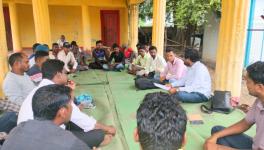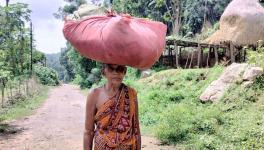UP Polls: 'Where Will We Go?' Ask Tribals in Chitrakoot on Being Served Eviction Notices
Banda (Uttar Pradesh): Raj Kumari, 42, is toiling hard on a small tract of land her in-laws left for her husband and his brothers in the Rajhaua forest at Manikpur block of Bundelkhand’s Chitrakoot district. She is oblivious that the authorities in Lucknow are framing policies to drive them out from their habitations. Along with Kumari, thousands of tribals run the risk of losing the land they owned for generations.
Around 45,000 adivasis (aboriginals) of at least 52 villages spread over 22 panchayats in the block have been served with eviction notices because their villages are located in Ranipur Wildlife Sanctuary (a sub-division of the Kaimur Wildlife Sanctuary in Bihar), which came into existence in 1980.
Chitrakoot district has vast tracts of forest land home to and a source of livelihood for the adivasis and other forest-dwelling communities and forest workers. Most of these people hail from economically weak backgrounds and depend on forest produce and forest land to sustain themselves and earn a decent living.
Forest officials are allegedly engaging in multiple methods of keeping the tribals away from forest lands. Instances of alleged intimidation, harassment and abuse of the tribals have been reported from villages such as Kihuniya, Nagar, Ranipur, Gopipur, Unchdih, etc.
Forest officials are allegedly preventing the forest dwellers from tilling their lands. When they object to these acts and stake their claim, they are allegedly threatened with the prospect of false cases and arrest. In Unchdih, the officials have dug up holes in adivasi farms and have planted saplings there instead.
The land belonging to Gram Panchayat (village panchayat) in Gopipur has allegedly been dug up. On the other side, the adivasis living in villages like Kihuniya, Unchadeeh and Ranipur are being evicted from their homes and not being allowed to cultivate the land.
Stories of Helplessness and Harassment
Kumari, with 11 others, have possession of over 1.2 acres in the forest where she claims she has been living for three generations and does community farming. They have been served notices by the Forest Department, which says that they have “illegally encroached upon” its land and that they are directed to vacate the area, failing which legal actions would be initiated against them.
“Our houses are set on fire and crops destroyed by officials, who are leaving no stone unturned to harass us so that we get scared and leave the forest. The Forest Department claims the land belongs to them, but the reality is it is our forefathers’ property,” she told NewsClick, asking where will they go in the absence of any alternate land being allotted.
Several of them have already been slapped with cases. Suggan, 48, a father of four, faces a case under Section 26 of the Indian Forest Act, 1927, for “illegally occupying government land, levelling it and using for farming and residential purposes”.
He has been asked to appear at the Ranger’s office and present his side.
The Forest Department officials are not the only ones who allegedly threaten their existence. They have to also deal with landlords of the area who, they say, do not let them do any farm activity of the land allotted to them decades ago.
Pokharhai from Unchadeeh village has one acre of land, which was allotted to her in-laws during the Indira Gandhi-led government.
“We are facing a double whammy. When we went to our field to sow wheat crop, the musclemen of local landlords came and stopped us from performing any farm activity. Forest guards also come with police and do not allow us to grow crops on our land. Fearing physical assault, we did not grow the crop,” said the mother of three young boys who used to work as a daily wage labourer in Delhi but lost the job during the COVID-19 induced lockdown last year.
She said she has been fighting for her land rights since 2006. “The police come and threaten us to frame us in cases whenever we try to reclaim the land. We are poor people; how can we fight with them?” she alleged.
These villages in the hinterland of the state are extremely backward. The majority of the men and women folk are unemployed. They say they do not get any work under MNREGA (rural job guarantee scheme).
“We are daily wage labourers, but there is no job. We get some work in agricultural fields, but it is not regular. We are paid Rs 200-Rs 250 a day, which is insufficient to meet ends. Whenever we manage to grow something in our fields, life becomes a bit easier. It solves the issue of food to a great extent. Otherwise, we have to depend on the free ration given by the government (under the public distribution System),” she said while noting that the rations were not enough as an individual only got five kilogrammes of rice and wheat, a packet of salt and one kilogramme of refined oil. “Fingerprint scanners of E-PoS machines (used in biometric authenticated public distribution systems) often fail to identify thumb impressions of many of us because of erosion of fingerprints. We have to stand in ques for two-three days to get the ration as a result of technical glitches,” Pokharhai complained.
Siya Dulari is a resident of Murkata village in Uchadil panchayat. The mother of five (two sons and three daughters) has seven members in her family to feed. His sons work in a brick kiln in Rajasthan. She is a landless tribal.
“We are the fifth generation of our family, which has been living here. But we don’t have even an inch of land. When we go to plough panchayat’s land for farming, forest guards along with cops come and forcefully stop us. If we argue, we are threatened that our male members will be put behind bars,” she narrated her ordeal.
With no income, her entire family has to work as daily wagers. Along with her husband, she works in fields, and her two young children work in a brick kiln in Jaipur. Siya has also been served a notice for “illegally encroaching” upon Forest Department’s land.
“We met all senior officials from district magistrate to commissioner to no avail for letting us grow crops in our fields. Though they assured all possible help and resolution for our issues, but nothing has happened so far,” Siya added.
She was joined by another woman of the same village who said elections came and went, but the tribal community continued to face an existential crisis. “The government whom we too had voted in the previous election is hell-bent on booting us out from our land. Where will we go? We have not been allotted any alternate place to live and perform farming activities,” the woman added, suggesting they were not at all interested in elections.
Naresh, 35, a resident of Amarpur village, said there was no work. “The ration we get is not enough for our survival. Not all of us have been given a pakka house (under the Uttar Pradesh Housing Development Scheme). We earn some money by selling woods we collect from the forest and by working as a daily wager. Suppose the government is really serious about doing something for our betterment. In that case, it must give possession of our land and provide necessary basic facilities an individual should get to spend a dignified life,” he said.
Shiv Prasad of Unchadeeh along with 30 others does a community farming on six acres of land. His last crop of wheat was allegedly destroyed by the forest officials who dug up the land. When he grew mustard this, it was also partially damaged. The huts they had erected near their agricultural field were also set on fire.
Community farming is a system of cultivation in tribal areas where a group of people jointly grow crops on certain piece of land under their possession with equal investment and physical labour. The yield is also equally distributed among them.
This is significant because the harassment and intimidation come in wake of Adivasis filing community claims to forest land in line with their rights enshrined in the Forest Rights Act, 2006 that gave back traditional forest dwellers their rights to govern, manage and access forest lands and resources within village boundaries, which had been controlled by the forest department since colonial times.
Violations of Forest Rights Act, 2006?
The law makes the Gram Sabha the statutory body for managing forestlands, and protecting them. It provides that no activity should be carried out in these forests until individual and community claims over them have been settled.
Activists believe that forceful evictions of the Adivasis are in violation of the provisions of The Scheduled Tribes and Other Traditional Forest Dwellers (Recognition of Forest Rights) Act, 2006. They further argue that it also goes against the Supreme Court order of February 2019, staying evictions of all forest dwellers from their lands in Wildlife First Vs. Union of India (35782/2019).
“The FRA clearly states that the gram sabha is supreme body in deciding the claims under the legislation. The Adivasis of 22 panchayats of Chitrakoot district are being pressurised to leave the forest because the Ranipur Wildlife Sanctuary has been declared a national park in 2001. However, they have lived in the forest for generations. But they now cannot collect bush mango, bush pepper, mushroom and wild fruits from the forest. How will they survive?” ask Raja Bhaiya, convener of the Vidya Dham Samiti, a Banda-based organisation that works for the rights of Adivasis and Dalits.
Forceful eviction of tribal communities is the highest form of human rights violation, he said, adding that the aboriginals efficiently protect the environment. “Tribals have played an important role in protecting and conserving wildlife and forests. Take for example, the conservation of blackbucks by these people in the Ganjam district of Odisha. Their number rose from 573 in 1990 to 4,044 in 2018. Therefore, they must be given legal rights to their land,” he added.
To remove the environmental and social injustice committed against these Adivasis by colonial laws such as the Indian Forest Rights Act of 1927, he said, the enactment of the FRA and PESA and recognising the rights and responsibilities of the Adivasis are necessary.
The Official Claims
However, contrary to the arguments, the Forest Department officials claim that the sanctuary has legal title over the forest. They are duty-bound to protect it and remove all illegal encroachments.
“The presence of tribal communities in the forest is causing damage to the wildlife and ecosystem. They often cut trees to sell woods in the market. The problem arose in 1994 when then UP Chief Minister Mayawati issued an administrative order announcing to give legal rights on lands in the forest to forest dwellers. All those who are encroaching upon the land are not at all living there for generations. The settlements are new,” a Forest Department official told NewsClick on strict condition of anonymity.
Asked about the notices the Adivasis were being served, he said it was being done as per law and rubbished all the allegations of forceful evictions.
When queried about the right to live a dignified life of the forest dwellers, he said it is the responsibility of the Revenue Department to rehabilitate them properly.
No senior official of the department agreed to come on record, citing the Model Code of Conducts, which is presently in place in the state, where Assembly elections will begin from February 10.
Evictions of the forest dwellers legally contradict the Forest Rights Act of 2006, which promises land security for forest peoples displaced from ancestral lands in the name of wildlife conservation and economic development. The legislation recognises forest people’s role in conservation and legally enshrines community forest rights, customary land rights and rights of indigenous communities to protect and manage forests.
However, the country’s highest judicial body’s decision, which ordered to evict over one million forest-dwelling people in case their application has been rejected under the Forest Rights Act (FRA), 2006, was also severely condemned by human and tribal rights activists.
Following collective advocacy by several rights groups, the SC was forced to stay its earlier decision. However, this is not the first case in India where the tribal communities have been asked to leave their homes in the name of conservation.
At least 450 families belonging to indigenous Baiga and Gond communities were evicted in 2014 to protect tigers in the Kanha Tiger Reserve.
Similarly, over 148 houses were demolished, and 156 families were evicted from Thatkola and Sargodu Forest Reserve in Karnataka, as per the SC orders, in April 2017. Also, in Assam, over 1,000 people from Mishing, Rabha and Bodo tribal communities were forcefully evicted from the Orange National Park in the same year.
Researches suggest that state authorities in many such evictions did not follow the due process established by national and international standards. These evictions resulted in a number of gross human rights violations.
Governments of several countries across the globe often encourage the eviction of tribal communities to boost safari, create protected areas, and attract tourism. The tribal communities, in this process, continue to pay the brutal price for conservation.
An estimated 50% of protected areas worldwide have been established on lands traditionally occupied and used by tribal people. Victoria Tauli-Corpuz, UN Special Rapporteur on the Rights of Indigenous Peoples, had said in 2019 in a statement, “For over a century, conservation has resulted in cultural destruction and large-scale displacements of tribal people from their ancestral lands.”
Get the latest reports & analysis with people's perspective on Protests, movements & deep analytical videos, discussions of the current affairs in your Telegram app. Subscribe to NewsClick's Telegram channel & get Real-Time updates on stories, as they get published on our website.
























